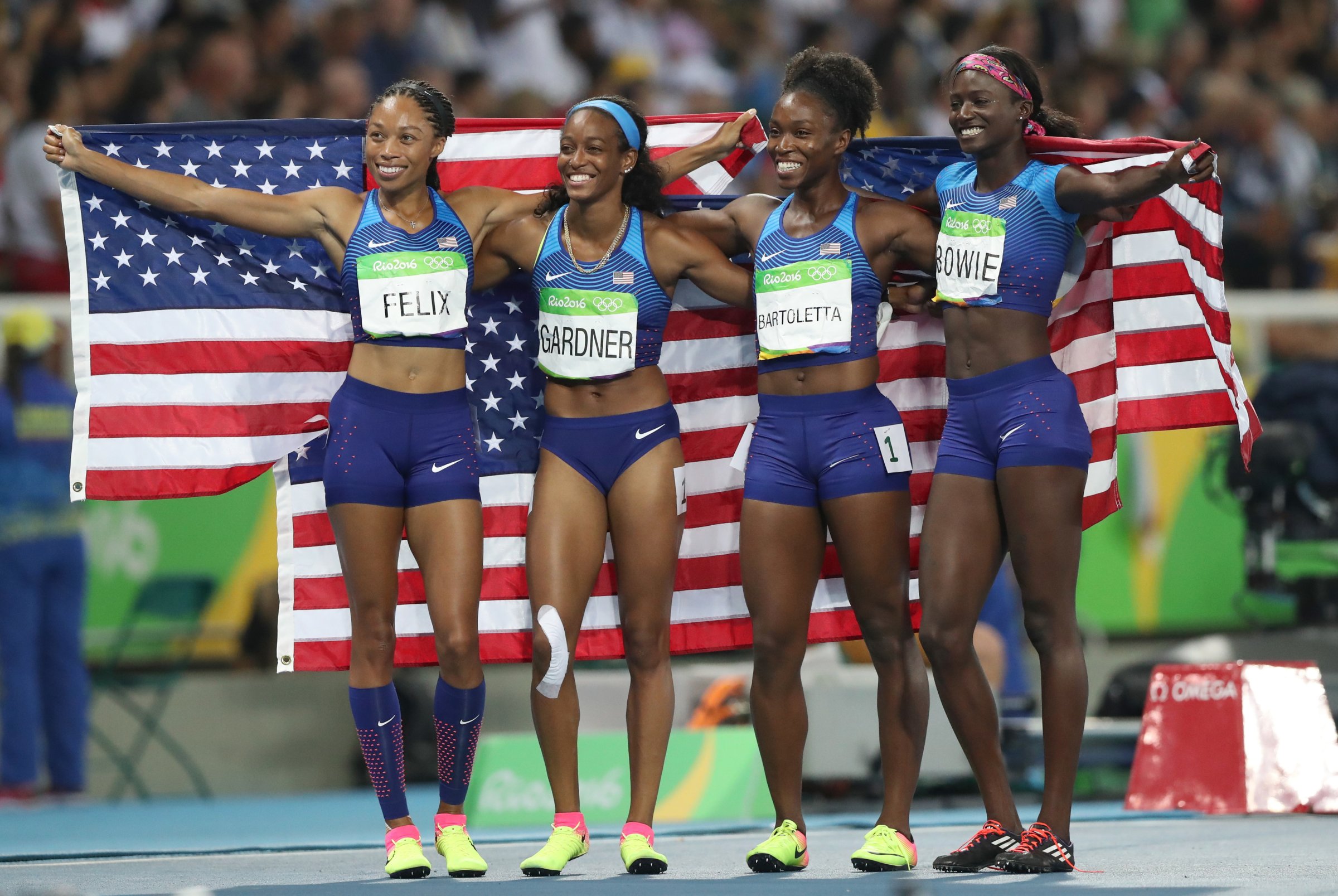
My former U.S. Track and Field teammate Tori Bowie, who was found dead in her home in Florida on May 2, of complications related to childbirth at 8 months pregnant, was a beautiful runner. She was effortless. At the Rio Olympics, I ran the second leg of the 4 x 100 relay. Tori was the anchor. When she got the baton, I remember thinking, “it’s over.” She just accelerated. When she crossed the finish line, I couldn’t wait to run over to her to celebrate. It was her first, and only, Olympic gold medal.
She also picked up a silver (in the 100-m) and bronze (200-m) in Brazil. The next year, at the 2017 World Championships in London, Tori won the 100-m title, earning the title of “world’s fastest woman.” Tori started out as a long jumper. So seeing her thrive as a sprinter was a huge deal. She was just such a bright light, and people were getting to see that.
Tori grew up in Mississippi and had this huge Southern accent. She didn’t take herself too seriously. You felt this sense of ease when you were around her. I last saw her in early 2021, in San Diego, where she was training. She gave me the biggest hug; something about her spirit was just very, very sweet. I felt her sweetness come over me that day.
Tori was 32 when she died. According to the autopsy, possible complications contributing to Bowie’s death included respiratory distress and eclampsia—seizures brought on by preeclampsia, a high blood pressure disorder that can occur during pregnancy. I developed preeclampsia during my pregnancy with my daughter Camryn, who was born in November 2018. The doctors sent me to the hospital, where I would deliver Camryn during an emergency C-section, at 32 weeks. I was unsure if I was going to make it. If I was ever going to hold my precious daughter.
More from TIME
Like so many Black women, I was unaware of the risks I faced while pregnant. According to the CDC, in 2021 the maternal mortality rate for Black women was 2.6 times the rate for white women. About five days before I gave birth to Camryn, I was having Thanksgiving dinner with my family. I mentioned that my feet were swollen. As we went around the table, the women shared their experiences during pregnancy. My cousin said she also had swollen feet. My mom didn’t. Not once did someone say, ‘oh, well, that’s one of the indicators of preeclampsia.’ None of us knew. When I became pregnant, my doctor didn’t sit me down and tell me, ‘these are things that you should look for in your pregnancy, because you are at a greater risk to experience these complications.’
That needs to change, now, especially in light of Tori’s tragic passing. Awareness is huge. Serena Williams had near-death complications during her pregnancy. Beyoncé developed preeclampsia. I hate that it takes Tori’s situation to put this back on the map and to get people to pay attention to it. But oftentimes, we need that wake-up call.
The medical community must do its part. There are so many stories of women dying who haven’t been heard. Doctors really need to hear the pain of Black women.
Luckily, there’s hope on several fronts. Congress has introduced the Momnibus Act, a package of 13 bills crafted to eliminate racial disparities in maternal health and improve outcomes across the board. California passed Momnibus legislation back in 2021. These laws make critical investments in areas like housing, nutrition, and transportation for underserved communities. Further, several pharmaceutical companies are making advances on early detection and treatment of preeclampsia.
Three gold medalists from that 4 x 100 relay team in Rio set out to become mothers. All three of us—all Black women—had serious complications. Tianna Madison has shared that she went into labor at 26 weeks and entered the hospital “with my medical advance directive AND my will.” Tori passed away. We’re dealing with a Black Maternal Health crisis. Here you have three Olympic champions, and we’re still at risk.
I would love to have another child. That’s something that I know for sure. But will I be here to raise that child? That’s a very real concern. And that’s a terrifying thing. This is America, in 2023, and Black women are dying while giving birth. It’s absurd.
I’m hopeful that things can get better. I’m hopeful that Tori, who stood on the podium at Rio, gold around her neck and sweetness in her soul, won’t die in vain.
—as told to Sean Gregory
More Must-Reads From TIME
- The 100 Most Influential People of 2024
- Coco Gauff Is Playing for Herself Now
- Scenes From Pro-Palestinian Encampments Across U.S. Universities
- 6 Compliments That Land Every Time
- If You're Dating Right Now , You're Brave: Column
- The AI That Could Heal a Divided Internet
- Fallout Is a Brilliant Model for the Future of Video Game Adaptations
- Want Weekly Recs on What to Watch, Read, and More? Sign Up for Worth Your Time
Contact us at letters@time.com